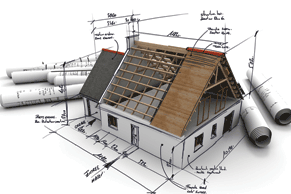
Reclaiming VAT on a garden office
Purpose of expense
Input tax can be claimed on an expense that is incurred for the purposes of a VAT-registered business, as long as it wholly relates to taxable supplies. These expenses include office accommodation and business overheads. For example, there is no problem with a firm of accountants claiming input tax on the cost of renting an office in a city centre.
Some rent payments are not subject to VAT, i.e. when the landlord has not opted to tax the building in question. In such cases rent payments are exempt from VAT.
Legal entity
It will be easier to claim input tax on the costs of building a new home office if the businesses is an unincorporated business, e.g. a sole trader or partnership. The invoices issued to them as the property owner will be in the same name as the VAT registration.
In the case of a limited company, it is therefore important that the company appoints and pays the builders and suppliers, rather than the directors receiving invoices in their own names and paying the relevant amounts from personal funds.
If the owner makes an advance payment to a builder this creates a tax point for VAT purposes. They should therefore ask the builder or supplier for an invoice so they can claim input tax on the payment. It's important not wait until the end of the job to do this.
Private or non-business use?
As long as it can be shown that there is a clear business purpose for the office, then input tax can be claimed on the costs incurred. However, if the intention to use the office for other things, e.g. for private hobbies and interests or those of family and friends, input tax claimed must be apportioned.
The method of apportionment is not prescribed. The business can use any method as long as it gives a fair and reasonable result.
If the business uses the flat rate scheme, it will not be able to claim input tax on the costs of building the new office. Although the scheme allows VAT to be claimed on capital expenditure goods costing more than £2,000 including VAT, such as a new van, this does not extend to capital expenditure on services linked to construction projects, including building materials.
Change of use in future
What is the situation if a business claims input tax on the costs of a new home office but then decides that homeworking is not suitable and return to a commercial office after, say, twelve months? In other words, there will be minimal or no business use of the office thereafter. Does it mean they have to repay the VAT?
There is need to readjust the original input tax claim as long as the project did not fall within the capital goods scheme, i.e. it didn’t cost more than £250,000 excluding VAT. If this figure was exceeded, input tax is adjusted over a ten-year period.

